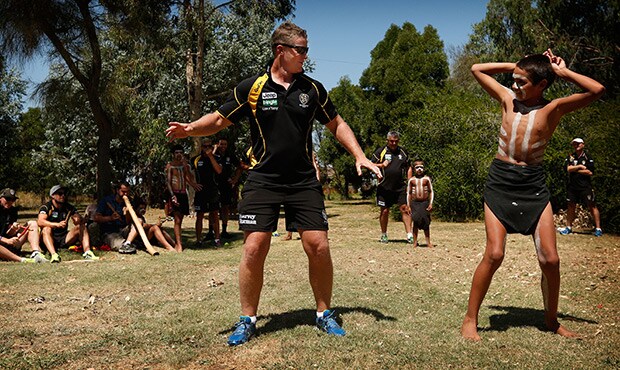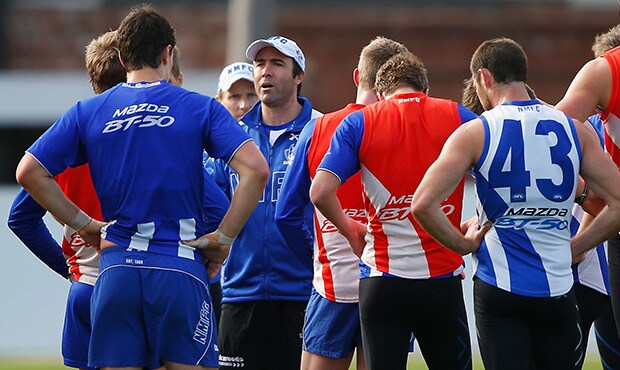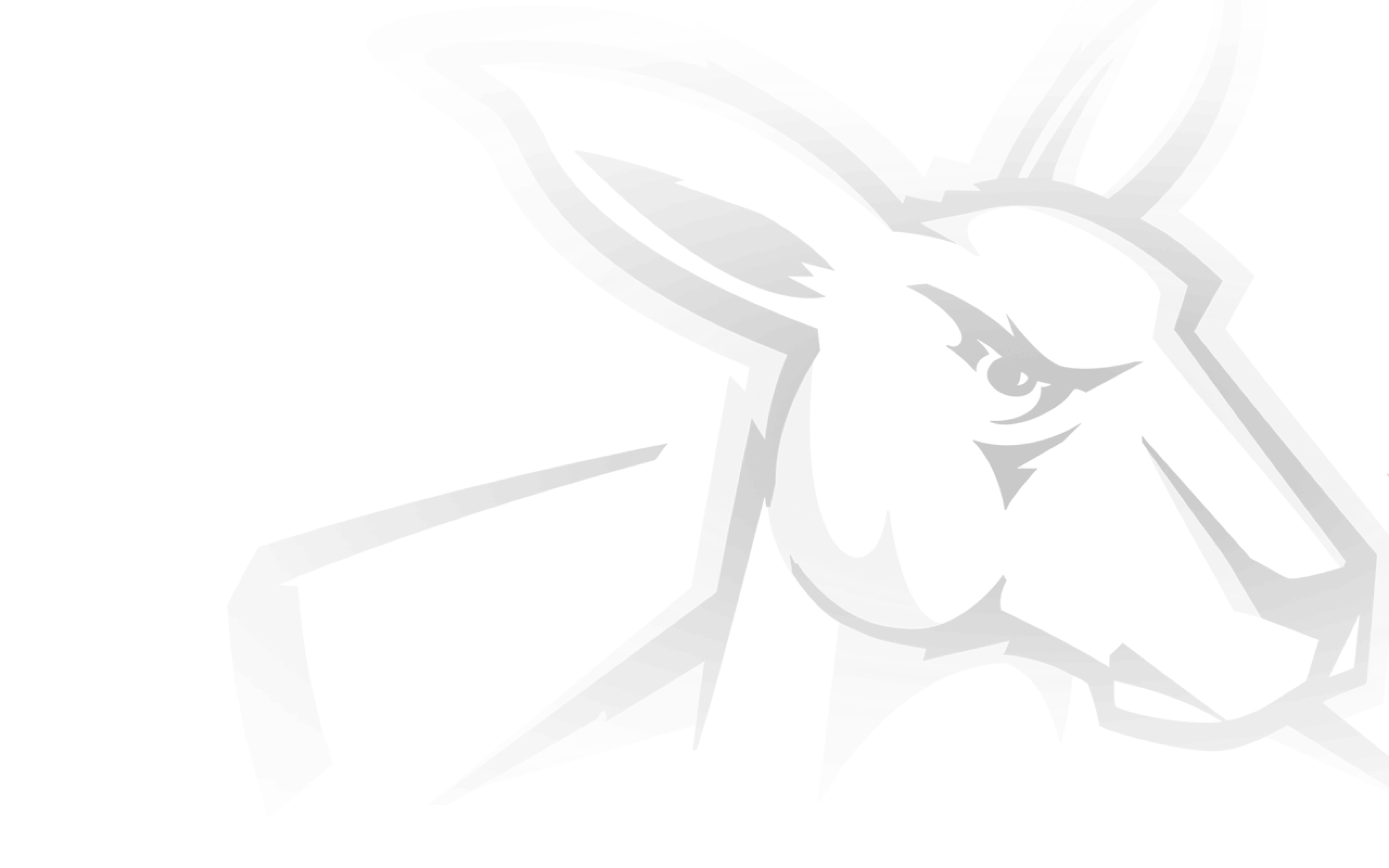First Scott, then 33, was named as North Melbourne coach, ironically getting the nod over Hardwick in a three-man contest that included then-Roos caretaker coach Darren Crocker.
Then Hardwick, who had narrowly missed out on becoming Kevin Sheedy's replacement at Essendon at the end of 2007, got his senior coaching chance at the age of 37 when he edged out Ken Hinkley for the Richmond job.
Scott, himself, had earlier interviewed with Richmond, but failed to make the final shortlist.
The parallels between the two young coaches did not end there.
Both entered the coaching ranks as two-time premiership players.
Both had been hard-nosed defenders like modern coaching greats Tom Hafey, Kevin Sheedy and Mick Malthouse.
Both inherited young lists in transition, Scott after Dean Laidley took the Roos to the finals in 2007 and 2008, Hardwick after Terry Wallace's five-year reign fizzled out.
This round, the pair celebrate their 100th games as coaches and, appropriately, they will do it together when their teams clash at Etihad Stadium on Sunday night.
Here, AFL.com.au looks at their journeys so far and who's best placed to achieve every coach's dream of a premiership.
STARTING POINT
DH: Hardwick took charge at Tigerland with the club once again back at square one following another false dawn. The Tigers had finished 15th in 2009 with just five wins, and Terry Wallace had stepped aside mid-season. At the press conference to announce his appointment as coach, Hardwick said: "I think I can deliver a blueprint for success that’s going to take the Richmond Football Club to its 11th premiership in the not-too-distant future." He came to the job after five seasons as an assistant coach at Hawthorn, where he was involved in the 2008 premiership.
BS: When Scott joined North, it was clear he faced a rebuilding period. North had made the 2007 and 2008 finals under Dean Laidley, but had fallen well short of the best teams in those series before slumping to 13th in 2009. Scott felt he was the perfect fit to develop the Roos' existing core of youngsters and the youngsters they would bring in over the next few years. "I want to create an environment and, won't stop until I do, where every player realises they've got every opportunity to be the best they can possibly be," Scott said at the press conference announcing his appointment. Scott was also hell-bent on changing the way North was perceived by the rest of the football world. "If there's one thing (about the club) I could change … it'd be the words struggling, battling, even shinboner."
LIST DEVELOPMENT
DH: It was clear a cleanout was required when Hardwick arrived, with senior players Matthew Richardson, Joel Bowden, Nathan Brown and Mark Coughlan among the departures. Jay Schulz was traded to Port Adelaide in a move that has backfired. Attempting to rebuild through compromised drafts have proved challenging for the Tigers and they have adapted a policy of retaining first-round selections (Dustin Martin, Brandon Ellis, Reece Conca, Nick Vlastuin, Ben Lennon) and then targeting mature talent from other clubs (Bachar Houli, Shaun Grigg, Troy Chaplin, Shaun Hampson, Chris Knights). The rookie list has been used to select players who can provide immediate back-up to the senior list, rather than as a development tool.
BS: When Scott walked into North, the Roos' recruiters had already assembled a solid core of youngsters around which he could rebuild: Andrew Swallow (2005 national draft), Lachlan Hansen, Todd Goldstein, Lindsay Thomas (2006), Scott Thompson (2007) and Jack Ziebell (2008). Still, Scott has embarked on an extensive remodel, with just 17 of the 46 players on North's 2009 list still at the club. The Roos have also continued to invest primarily in youth, with 23 of the 39 players brought in during his reign being junior stars, among them Ben Cunnington, Ryan Bastinac, Aaron Black, Shaun Atley and Luke McDonald. Unlike Richmond under Hardwick, that philosophy has extended to North's rookie list, which Scott has used to develop project players like Majak Daw and Kayne Turner. Scott has also brought in six untried mature-age players, including international recruit Eric Wallace, and recycled 10 players from other clubs, six of whom are still on North's list.

Damien Hardwick performs a tradition indigenous dance in Warnambool during Richmond's pre-season community camp. Picture: AFL Media
PHILOSOPHIES
DH: Hardwick's No.1 team rule is "hard at the ball when it's your turn" and a team-first culture is something he believes strongly in. Earlier this season he reacted strongly when Jack Riewoldt spoke out of school about the Tigers' game plan and suggested they had attempted to copy Hawthorn precise-kicking style. Yet it was hard to argue with Riewoldt's observation. In 2013 the Tigers moved the ball quickly, used the corridor and were generally an exciting side to watch. This year they are attempting to control possession and the tempo of games more. As a result they are averaging 14 points less per game, compared to 2013.
BS: If Scott has had one non-negotiable expectation of his players during his reign, it's that they pride themselves on winning the contested ball. But the North coach has been more flexible with his game plan, making significant changes over the past three seasons. In 2012, North became one of the AFL's most attacking teams, moving the ball at breakneck speed with audacious chains of handball. Last season, they were just as attacking, but went by foot far more often, preferring to take safe short options. This year, Scott has introduced a far more defensive game plan that has seen North concede 12 fewer points per match than in 2013, but also score 20 fewer points per game.
BEST STRETCH
DH: Hardwick's men won 10 of their last 13 games last year to return to the finals for the first time since 2001. It was a brilliant run that included wins over eventual Grand Finalists Hawthorn and Fremantle, giving the Tigers added credibility. They scored more than 100 points in seven of those wins, entering the finals with an attacking edge that, sadly for the Tiger faithful, hasn't been seen since.
BS: In the second half of 2012, Scott's young team gave the first clear signal that it could become a future force. From rounds 12-21, the Roos won nine of 10 games, their only loss to eventual top-four finisher West Coast by two points at Blundstone Arena. In that run, North beat eventual preliminary finalists Adelaide and Collingwood – after conceding the Pies a four-goal head start – and got past bogey team St Kilda. More significantly, the Roos played an exhilarating brand of football that looked capable of consistently troubling the competition's top teams.

Brad Scott rallies the troops at a North Melbourne training session this week. Picture: AFL Media
HARDEST RUN
DH: Hardwick is right in the thick of his toughest period in charge. The Tigers' season got off to a disastrous start with losses to Gold Coast and the Western Bulldogs in the first three rounds, and they were well short of top teams Hawthorn and Collingwood. There is pressure to burn because the Tigers finished fifth last season and recruited to make a strong push for the top four. After four seasons of steady improvement, Hardwick is now having his methods tested.
BS: This one's a tie. In Scott's first two-and-a-half seasons, the Roos could not cut it against top-four teams. In that time, they did not beat one premiership contender and too often simply couldn't compete with them, suffering three losses by more than 100 points and another five by 11 goals or more. Last season was just as trying for Scott, but for vastly different reasons. Barring six-goal losses to the Sydney Swans and Fremantle, the Roos were chances to win every game they played in 2013. But they blew an incredible five matches by four points or less and another five by 16 points or less to miss the finals by one game.
THE FUTURE
DH: Hardwick signed a two-year contract extension in December last year, tying him to the club until the end of 2016. President Peggy O'Neal and CEO Brendon Gale have recently backed the coach, with pressure directed at a number of under-performing players rather than Hardwick himself. His goal of delivering the club's 11th premiership "in the not-to-distant future", however, appears a long shot.
BS: Scott is contracted to the end of 2016 and could extend his reign well beyond that, given North – despite its chronic inconsistency this season – looks well placed to become a regular finalist over the coming seasons. The big question is whether the Roos have the talent to compete with Gold Coast and Greater Western Sydney when the expansion teams' premiership windows open, which could happen as early as next season for the Suns.
WHO'S AHEAD?
Scott has so far led North to 51 wins and 48 losses for a 51.5 per cent winning rate. North has never finished below 10th under Scott, but has played just one final, in 2012, when it was smashed by West Coast by 96 points at Patersons Stadium. Hardwick, meanwhile, has coached the Tigers to 42 wins, 55 losses and two draws for a winning rate of 42.4 per cent. The Tigers had progressed steadily under his coaching, but 2014 has been a big step backwards. In that context, Scott is ahead and appears to have brighter short-term prospects with the Roos.


